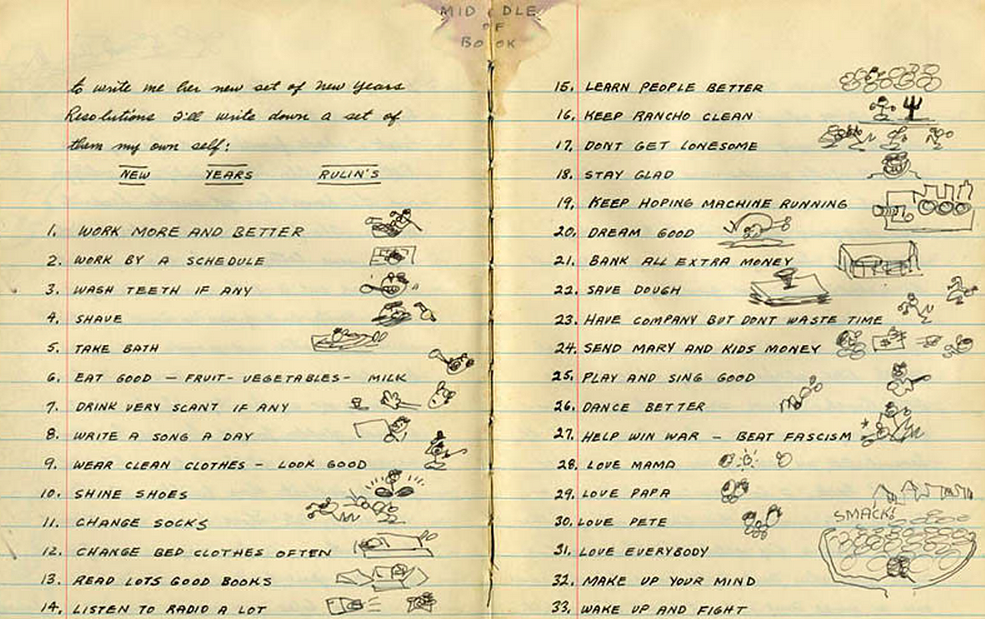Woody Guthrie Creates a Doodle-Filled List of 33 New Year’s Resolutions (1943): Beat Fascism, Write a Song a Day, and Keep the Hoping Machine Running

On January 1, 1943, the American folk music legend Woody Guthrie jotted in his journal a list of 33 “New Years Rulin's." Nowadays, we'd call them New Year's Resolutions. Adorned by doodles, the list is down to earth by any measure. Family, song, taking a political stand, personal hygiene -- they're the values or aspirations that top his list. You can click here to view the list in a larger format. Below, we have provided a transcript of Guthrie's Rulin's.
1. Work more and better
2. Work by a schedule
3. Wash teeth if any
4. Shave
5. Take bath
6. Eat good — fruit — vegetables — milk
7. Drink very scant if any
8. Write a song a day
9. Wear clean clothes — look good
10. Shine shoes
11. Change socks
12. Change bed cloths often
13. Read lots good books
14. Listen to radio a lot
15. Learn people better
16. Keep rancho clean
17. Dont get lonesome
18. Stay glad
19. Keep hoping machine running
20. Dream good
21. Bank all extra money
22. Save dough
23. Have company but dont waste time
24. Send Mary and kids money
25. Play and sing good
26. Dance better
27. Help win war — beat fascism
28. Love mama
29. Love papa
30. Love Pete
31. Love everybody
32. Make up your mind
33. Wake up and fight
We wish you all a happy 2020.
Would you like to support the mission of Open Culture? Please consider making a donation to our site. It's hard to rely 100% on ads, and your contributions will help us continue providing the best free cultural and educational materials to learners everywhere.
Also consider following Open Culture on Facebook and Twitter and sharing intelligent media with your friends. Or sign up for our daily email and get a daily dose of Open Culture in your inbox.
Note: This fine list originally appeared on our site back in 2014.
Related Content:
The Top 10 New Year’s Resolutions Read by Bob Dylan
Marilyn Monroe’s Go-Getter List of New Year’s Resolutions (1955)
Woody Guthrie Creates a Doodle-Filled List of 33 New Year’s Resolutions (1943): Beat Fascism, Write a Song a Day, and Keep the Hoping Machine Running is a post from: Open Culture. Follow us on Facebook, Twitter, and Google Plus, or get our Daily Email. And don't miss our big collections of Free Online Courses, Free Online Movies, Free eBooks, Free Audio Books, Free Foreign Language Lessons, and MOOCs.
from Open Culture https://ift.tt/2QvF6sI
via Ilumina
Comments
Post a Comment